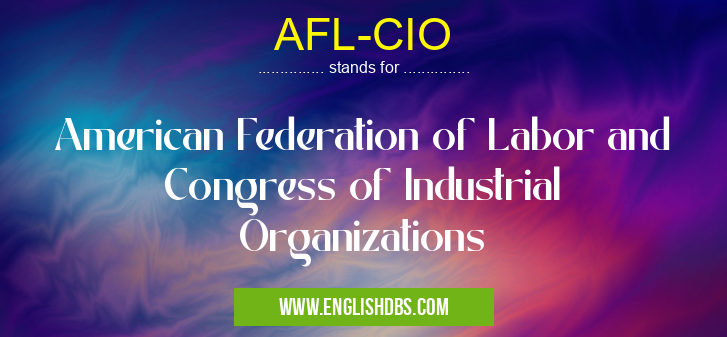What does AFL-CIO mean in UNIONS
The American Federation of Labor and Congress of Industrial Organizations, or AFL-CIO for short, is one of the largest labor unions in the United States. It is a union of 56 independent national and international labor unions working to improve the lives of their members and strengthen America's middle class. Through collective bargaining and political action, they seek better wages, benefits, and working conditions for all workers. The AFL-CIO also works to build an economy that works for everyone by advocating for laws that protect workers’ rights on the job and ensure economic security for all. Their mission is to enable every working person in the country to have a voice on the job, in government, and in their communities.

AFL-CIO meaning in Unions in Community
AFL-CIO mostly used in an acronym Unions in Category Community that means American Federation of Labor and Congress of Industrial Organizations
Shorthand: AFL-CIO,
Full Form: American Federation of Labor and Congress of Industrial Organizations
For more information of "American Federation of Labor and Congress of Industrial Organizations", see the section below.
What Does AFL-CIO Stand For?
AFL-CIO stands for the American Federation of Labor and Congress of Industrial Organizations. The federation was formed in 1955 when two large trade unions—the American Federation of Labor (AFL) and the Congress of Industrial Organizations (CIO)—merged following years of fierce competition between them. Since then, it has become one of the most influential labor unions in America with over 12 million members throughout its 56 constituent unions – representing both private sector as well as public sector employees across many different industries.
The Mission Of The AFL-CIO
The mission of AFL-CIO is simple yet powerful: “to make sure working people have a strong voice at work and in our democracy”. To achieve this goal, they strive to create broad economic opportunity through advocacy initiatives such as increasing minimum wage; ensuring healthcare coverage for all; expanding access to retirement savings; investing more into infrastructure programs; protecting consumers from predatory practices; upholding freedom from discrimination on gender identity or sexual orientation; and defending workers’ right to organize collective bargaining agreements. Additionally, they focus their efforts on helping people secure safe workplaces with fair pay along with basic workplace benefits like paid sick leave. By doing so, they hope to lift up individuals who are often left behind or forgotten by politicians who favor wealthier interests at the expense of vulnerable populations within society. They further strive to create an environment within which employers focus more on creating good jobs rather than cutting costs while employees receive adequate compensation for their labors. In doing so they hope that not only do workers gain more control over their own destiny but also that future generations are provided greater opportunities than those before them enjoyed.
Essential Questions and Answers on American Federation of Labor and Congress of Industrial Organizations in "COMMUNITY»UNIONS"
What is the AFL-CIO?
The AFL-CIO stands for the American Federation of Labor and Congress of Industrial Organizations. It is a union of labor unions comprising 57 national and international organizations representing over 12 million working men and women throughout the United States.
What does the AFL-CIO do?
The AFL-CIO works to ensure workers have a voice in their workplace by engaging in collective bargaining with employers, advocating on behalf of working families, and challenging laws that threaten their ability to make ends meet.
How does the AFL-CIO influence public policy?
Through its departments, affiliates, and allies, the AFL-CIO engages elected officials at all levels of government to advocate for laws, regulations, and policies that promote economic fairness, protect workers' rights, and strengthen civil society. The organization also mobilizes its members to encourage voter registration and participation in elections.
Who are some notable individuals associated with the AFL-CIO?
Some prominent figures associated with the AFL-CIO include legendary labor leader Walter Reuther; civil rights icon A. Philip Randolph; Barbara Easterling, former president of Communications Workers of America (CWA); John Sweeney, former president of Service Employees International Union (SEIU); and current President Richard Trumka.
When was the AFL-CIO founded?
The American Federation of Labor (AFL) was founded in 1886 while Congress of Industrial Organizations (CIO) was formed in1935 when UMWA's John L. Lewis had pulled out from the existing umbrella Labor union organization - American Federation Of Labor (AFL). Later In 1955 both organizations merged together as ‘American Federation Of Labor - Congress Of Industrial Organizations’ OR ‘AFL - CIO’.
What legislative achievements has been made by the AFL-CIO?
The organisation has been successful in pushing through major pieces of legislation such as passage in 1983 passage of landmark amendments to Title VII of the 1964 Civil Rights Act that protected workers against discrimination based on characteristics such as age or disability; created Family Medical Leave Act guaranteeing unpaid leave for family situations; won National Organize Freedom Act to protect worker’s right to organize; introduction and passage Trade Adjustment Assistance reform act providing resources to help laid off employees cope with job loss; among other victories.
Doesthe AFL-CIOhave any partnerships with companies or organizations?
Yes!The AFL–CIOhas collaborated on projects and initiatives with other companiesand organisationsincluding Unions21, Campaignfor Fair Food Standards/Coalitionof Immokalee Workers(CIW), Good Jobs Nationand others.
Final Words:
Through advocating good policies like raising minimum wages and protecting vulnerable populations from exploitation at work, AFL-CIO seeks to create a strong voice for working people throughout America – whether organized or unorganized – thereby creating much needed job security and economic stability amidst our ever changing global landscape. Regardless if you’re a union member or not, understanding what this important organization stands for can help you become an effective partner within your own community leadership team while promoting diverse voices through fostering equitable opportunities within our economy today - no matter where you come from or how much you earn.
